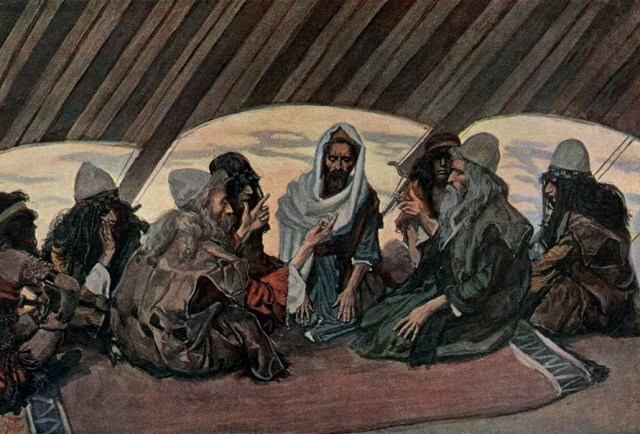And Yitzchak brought her [Rivkah] into the tent of his mother Sarah...and he loved her; and Yitzchak was comforted after his mother's death. (Bereishit 24:67)
Sarah lived on…in Rivkah's virtues.
The Midrash reports that as long as Sarah was alive there used to be a [sheltering] cloud over her tent. (Bereishit Rabbah 60:16) The doors were open to offer hospitality, the
challah displayed signs of having been blessed, and a light burned from one
Erev Shabbat to the next. All of these phenomena ceased when Sarah died; they now resumed when Rivkah moved into that tent.
Woman had been assigned three tasks to help repair the imbalance created in the universe due to the sin of Chavah. They are: the consecration of the first part of her dough [called "
challah"], the observance of the laws of family purity, and the periodic kindling of a light [i.e. on
Shabbat eve].
Man is composed of 4 basic elements: matter [in Hebrew, "
chomer"], life-force [
Nefesh], spirit [
Ruach], and soul [
Neshamah]. Chavah had upset three [the most elemental] of these four elements; the soul, however, had not been damaged, being incapable of corruption at the hands of human beings, according to Kabbalah. A sin which would potentially corrupt the soul would result in the soul leaving man before he had a chance to commit such a sin.
Bereishit Rabbah 14 states that the mist rising from the earth prior to the first rainfall was like a woman who mixes water with the dough and separates the
challah, the kohen's portion. Only after this process had been completed did G‑d create man from the dust which had been so treated.
Man is viewed as the "
challah" of nature, in that just as
challah represents the entire dough, so man represents the whole earth. Just as
challah is holy, so man is the holy part of nature. Until sanctity was formed, one could not partake of any part of Creation, just as one must not benefit from the dough until
challah has been separated from it.
Man may be viewed as having been created from the site of his eventual atonement, the site of the altar, the Temple. By having caused contamination of this most refined of raw materials in existence, Chavah caused eventual death. Therefore she had to make repairs, albeit of a symbolic nature.
Concerning the
Nefesh, the life-force, she had to atone through the blood of menstruation [spilling some of her life-force - blood]. Concerning the contamination of the
Ruach, spirit, she had been guilty of corrupting a spirit originating in the realms of angels; she therefore had to light the
Shabbat candles which symbolize the enhanced spiritual nature of the
Shabbat. Concerning the physical raw material, she had to set aside the
challah, a portion of the most hard-won fruit of nature, bread.
By performing her part as the woman par excellence, Sarah's virtue was recognized through the blessing she spread and conferred on others. Her dough was blessed, her light never went out, her doors remained open for all to look inside and to see that there was no impurity concealed within her tent. The fourth phenomenon, the one which had never been absent, is the proximity of the Divine Spirit which rests on all that is complete and whole.
Although Sarah had had to correct only three imbalances, the author of that same Midrash credits her with having restored all four elements to their appropriate position and condition. The fact that all these phenomena ceased to be manifest after her death proved to one and all that their presence had been due to her merit. Yitzchak had wanted to test Rivkah's ability to restore these phenomena, i.e. to restore his mother's tent to its former glory. This is why he brought her into his mother's tent instead of providing new quarters for her. When he saw that the four "halos" of Sarah had been restored, he considered her presence the fifth such halo, the fifth ingredient. This is the allusion represented by the letter
ה (
heh), whose numerical value is 5, in front of the word "
ha'ohalah" ["to her tent"].
Source: Torat Moshe by Rabbi Moshe Alshich of Tzfat-Safed, Chabad.org
--------------
Parashat Chayei SarahChayei Sarah PardesHaftarah Chayei Sarah















